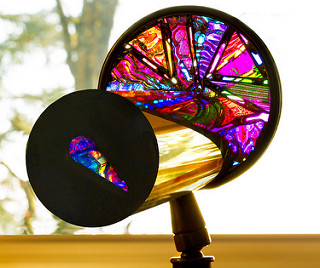There is no such thing as a new idea. It is impossible. We simply take a lot of old ideas and put them into a sort of mental kaleidoscope. We give them a turn and they make new and curious combinations. We keep on turning and making new combinations indefinitely; but they are the same old pieces of colored glass that have been in use through all the ages.
– Mark Twain, a Biography
According to Mr. Twain, it seems that we are mere scope-vessels with ideas turning within us, and those colorful ideas are nothing new and nothing unique. Yet somehow we discuss creativity and call things creative and we “know it when we see it”. If ideas are not unique then maybe the people-vessels in which the creative ideas turn are you-nique. Or maybe the process of turning the creative ideas around is unique. Or maybe the result is unique and new.
So, what is creativity ? And, how does Innovation fit in to the discussion?
Historically, when we thought of or discussed creative people, we were talking about artists — their careers paths get labelled the “creative arts” and their workplace leaders get the nice label “creative director”. Fancy, and it sounds like fun too! I want to be a “creative fancy-pants!” Over time, terms changed and intermingled and now when we think of creative people, we consider a broader category of roles which includes business people, and those from science and engineering. Still, however, we don’t usually say “oh, that smart lady Heidi got a degree in computer science and she is pursuing a life in the ‘creative sciences’.” We should though! The sciences are very creative.
The academic definition is that creativity, as defined in psychological journals, is an idea, process, or product which demonstrates novelty and usefulness to a group or individual (Simonton, 2000; Amabile, 1996; Sternberg, 2009). This is a pretty broad definition: it includes un-instantiated, perhaps even unspoken parts, (ideas), as well as implemented objects (process or products) which are then judged as novel or useful either privately (to an individual), or made public and reviewed by a group (social evaluation).
So creativity is:
- an idea or thing
- useful
- novel
- judged to be useful and novel by a group or individual.
Complicated, right? You bet.Creativity is complex and complicated. There’s many holes in this definition… but that is a topic for another discussion.
Just to complicate things more, let’s talk about innovation. Innovation is based on creativity but is different. It’s a term developed by business to described creativity from the business (production, capitalist) perspective. The definition of innovation expounds upon creativity by adding the dimension of organizational value related to actual production, in other words, innovation is the implementation of creative ideas (DiLiello, 2008; Pirola-Merlo & Mann, 2004), or, as one would say in industry, “innovation is the operationalizing of creativity.”
In real life, we intermingle these terms without differentiating them. This is not usually a problem except that we can forget that creativity is the foundation of innovation and that it’s possible to have a creative idea without ever instantiating it. It’s possible to evaluate ideas without ever implementing them as well. In fact, it’s possible to be really good at one part of creativity and bad at other parts (see the post that discusses practical perfectionists (good idea-ists, great instantiators, poor evaluators) and theoretical perfectionists (great idea-ists, poor instantiators, good evaluators).
